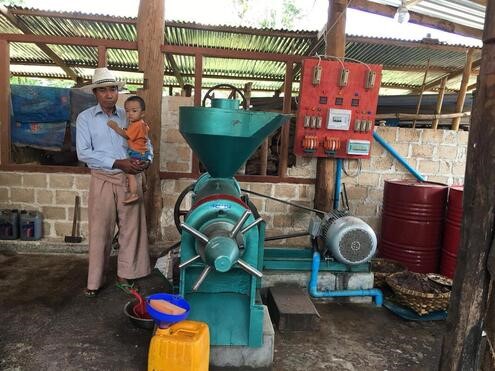
Join the WISIONS webinar this month on mini-grid sustainability!
http://www.hpnet.org/blog/webinar-minigrid-sustainability-socialenterprise
MINI-GRID SUSTAINABILITY:
TRANSITIONING TO SOCIAL ENTERPRISE FOR ENERGY AND ECONOMIC DEVELOPMENT
DATE: TUESDAY, SEPTEMBER 17, 2019
TIME: 8 AM EDT / 2 PM CEST / 7 PM JAKARTA
Registration link below
Collective research and hindsight within the Hydro Empowerment Network reveal that the long-term sustainability and impact of hydro mini-grids is dependent on how well the project is run as a viable and inclusive enterprise. This webinar – the 3rd in the series – will feature mini-grid practitioners in South and Southeast Asia who are leading the transition from grant-dependent to enterprise-based micro and mini hydropower projects. The webinar will present:
- The linkage between enterprise-based approaches and long-lived hydro mini-grids;
- Best practices to transition from grant-dependent to local social enterprise models, based on micro hydro experience in Nepal, Malaysia, and Indonesia;
- Solutions to scale their efforts to more micro hydro communities, including how to make better use of funding resources that currently go toward grant-dependent projects.
Presentations will be followed by a Q/A session open to all participants.
Learn more about our 2019 Mini-Grid Webinar Series, hosted by WISIONS and energypedia here!
WEBINAR BACKGROUND
In contexts where small-scale, community-based hydro mini-grids have been scaled to thousands of communities, projects typically have been funded by grant or subsidy programs, e.g. Nepal and Indonesia. The primary ownership and management structure in these projects has been user-based groups, e.g. village electrification committees (VECs), which can be inclusive but are challenged in achieving financial sustainability. Most projects operate only for night-time use, although electricity is available 24 hours -- leading to minimal revenue generation. Due to limited revenue, there is no savings. So when repair and maintenance is required the VECs raise funds through door-to-door collection. This is time intensive and a heavy burden for VEC leadership.
However, there are exceptions where scaled implementation of hydro mini-grids has occurred without grants and subsidies, e.g. Afghanistan and Myanmar. In these cases, projects have been driven by enterprise development that has enabled revenue-generation sufficient for micro hydro O/M, repair, and capital costs in some projects. Because the project have included self-financing, ownership and management structures have varied from VECs to cooperative-owned, developer-owned, and hybrid community-private models. A common factor among the different model has been the presence of an entrepreneurial individual or organization. This entrepreneur is keenly able to identify, establish, and incentivize productive end use -- often agri-processing -- which generates local economic value-add and ultimately runs the micro hydro as a sustainable enterprise.

Over the last year HPNET has facilitated a closer look to understand the factors for sustaining hydro mini-grids over the long-term. In comparing the above two scenarios it has become evident that:
- Grant and subsidy dependent projects often lead to projects with poor load factors and therefore inadequate revenue generation to enable long-term financial sustainability.
- Ownership models of grant-dependent projects tend to be inclusive but typically are not conducive for enterprise development -- simply because user-based groups funded by grants were not required to perceive the need or knowhow to establish financial sustainability.
- While self-financed enterprise-driven projects have strong financial viability, they require more time to develop inclusive affordability and equitable benefits among factions of the community.
- To achieve both revenue-driven and equitable hydro mini-grids, a transition is needed toward local social enterprise, bringing economic value-add to the mini-grid, village enterprises, local social services, and households.
- A high impact end use for value-add of electricity is local agriculture and agri-processing; however tapping it requires energy practitioners to work with agri-value chain practitioners.
To support local practitioners and micro hydro communities in this transition, HPNET has established the initiative Social Enterprise for Energy and Economic Development (SEEED). One of its initial objectives is to identify and highlight the work of practitioners who are already paving the path toward long-lived mini-grids anchored in local social enterprise. This webinar helps to do so.

 Join our list of experts
Join our list of experts